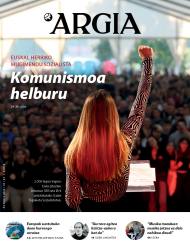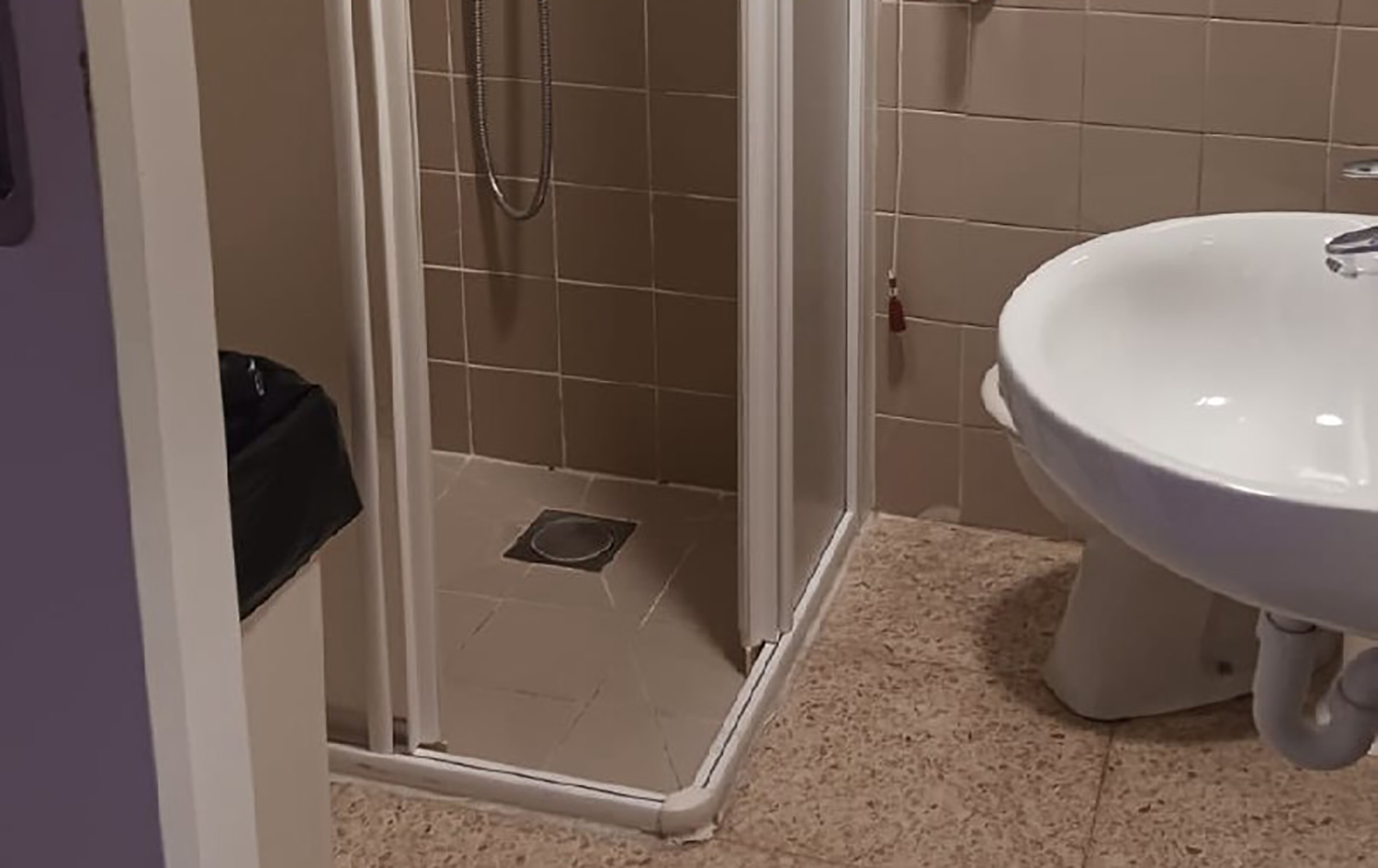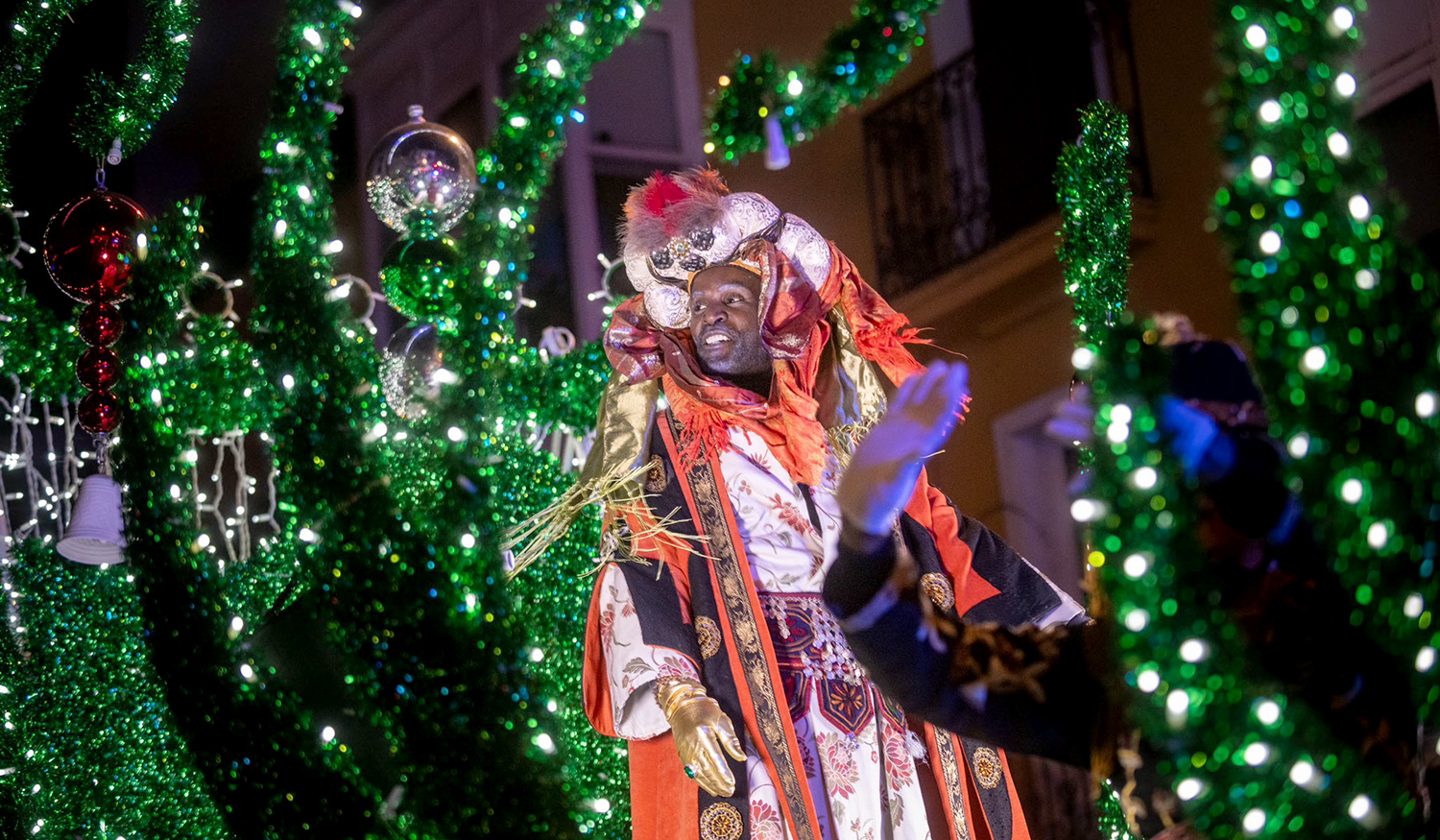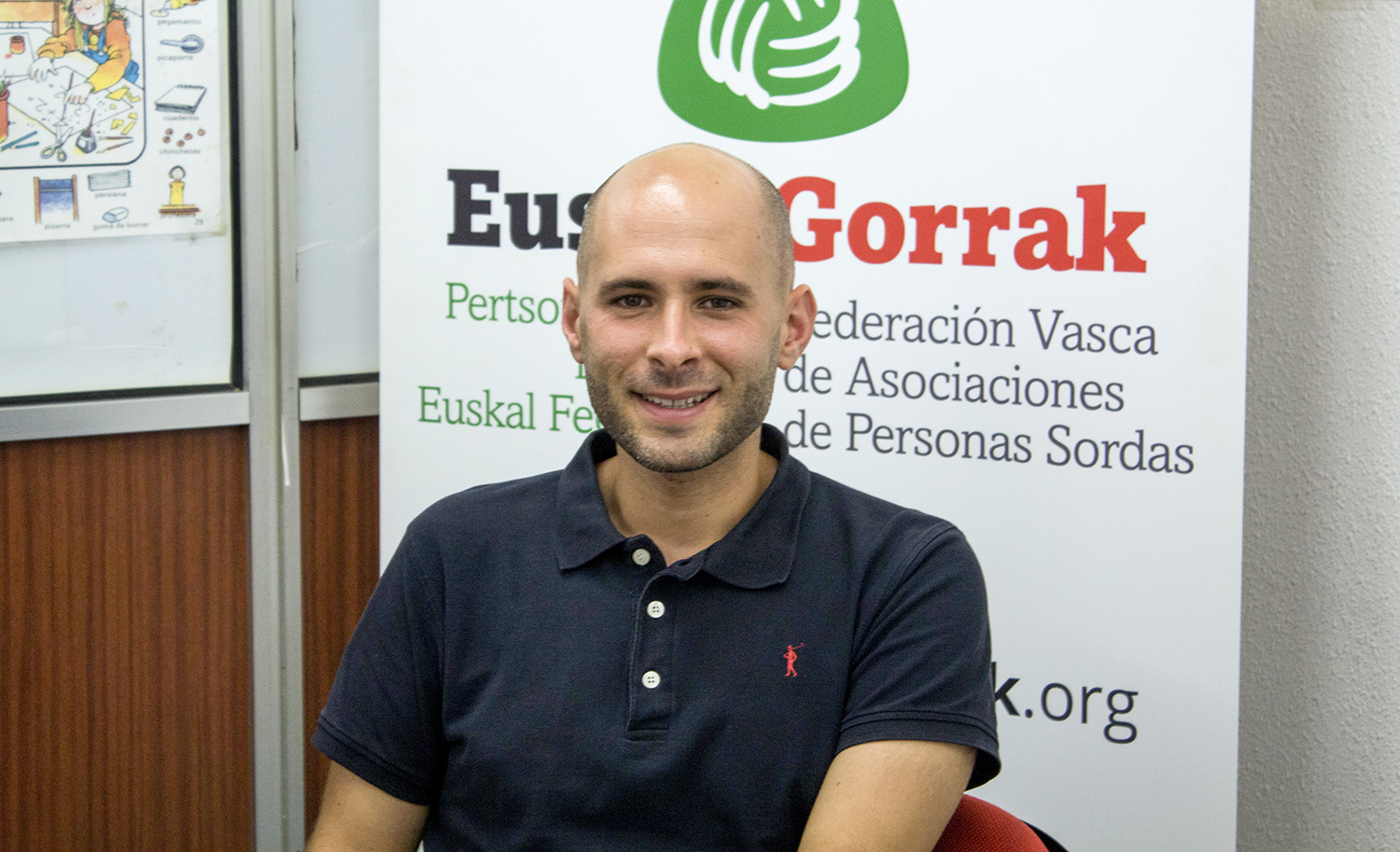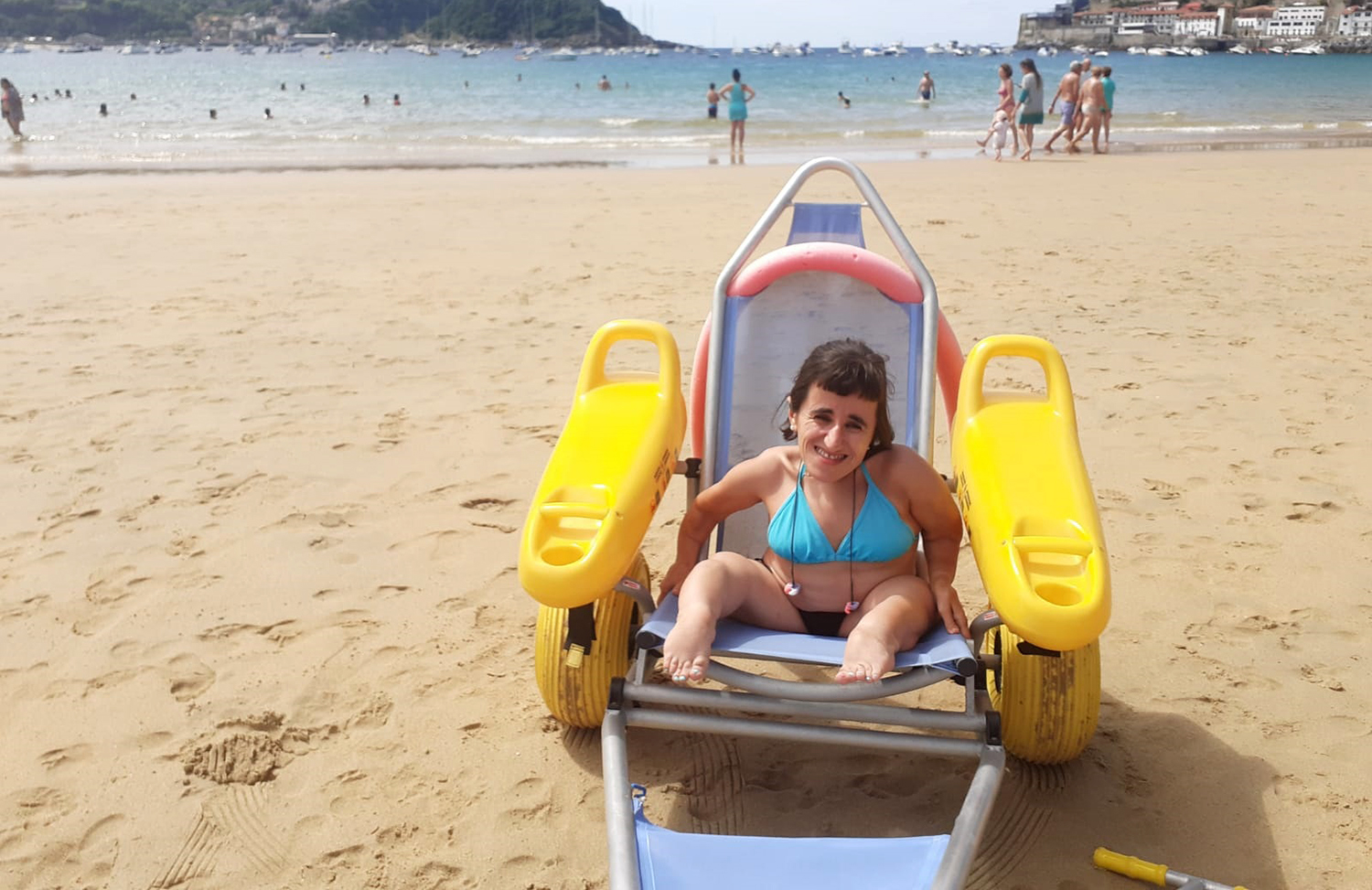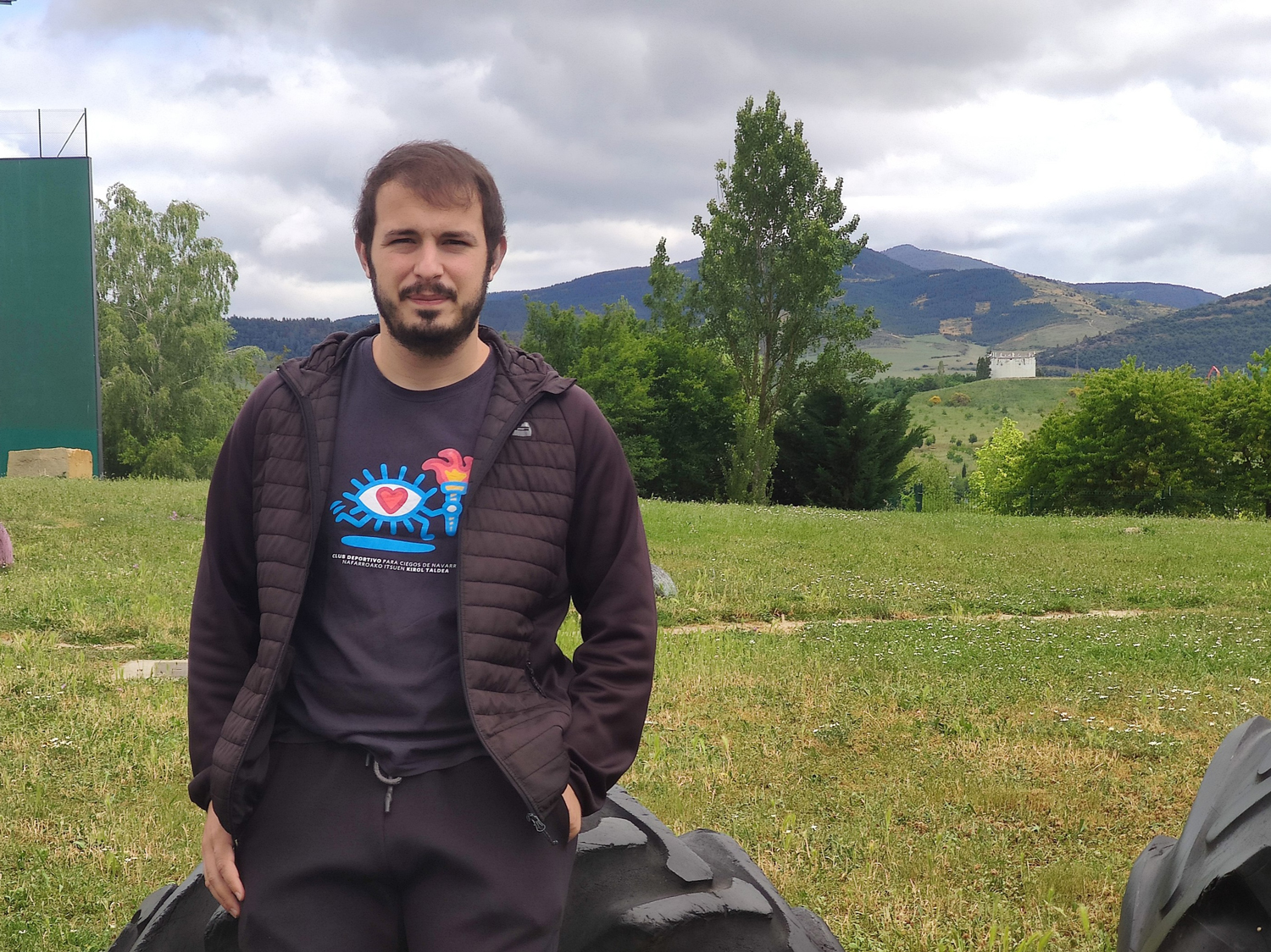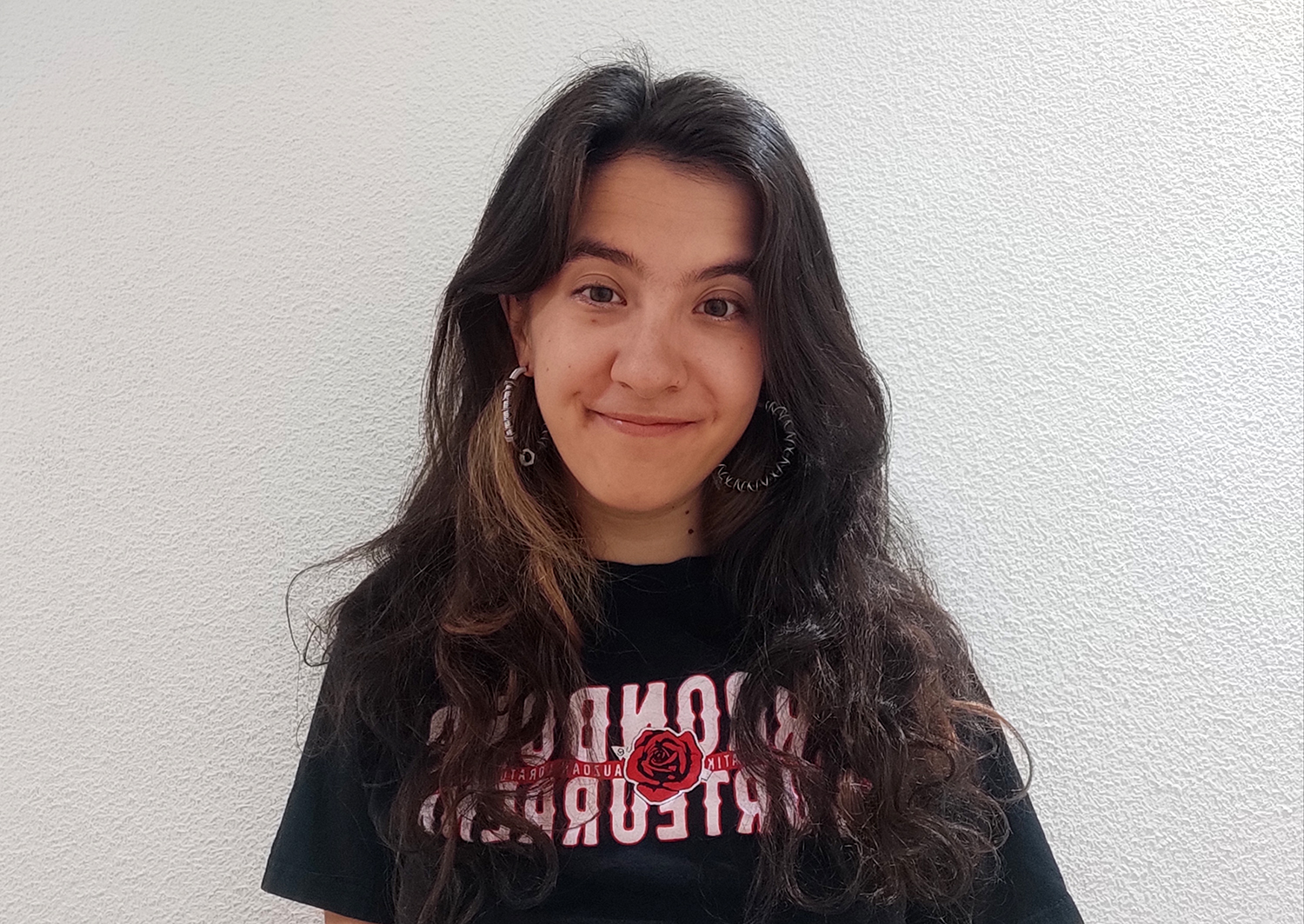"Can I be blind as a student, but a blind man can't be a professor?"
- We connect from the headset to the headset rather than through the screen. We've already started talking, and Oier has interviewed me to figure it out. Speak clearly. This thing you're going to read or listen to is almost a literal transcript of the conversation held.

OIER LAKUNTZA IRIGOIEN PAMPLONA, 1985
He's a PhD in quantum chemistry and he works as a researcher. He is also bertsolari and has just participated in this year’s Navarro Bertsolaris Championship. Due to Wolfram syndrome, he lives with visual and auditory impairment.
How do you remember your childhood?
I have always lived in the centre of Pamplona. I was born here, and here are my first memories. Here and in Urdiain, because as a child we spent weekends and holidays mostly in the village of the mother. I relate childhood to these two places. And I relate the issue of the syndrome to childhood memories. The first symptom was diabetes. I was 4 years old when they realized I had type 1 diabetes. And the diagnosis of Wolfram syndrome came to me when I was 6-7 years old. It was pretty soon. My parents didn't tell me about everything they knew about the syndrome. I was told I had a name, but they didn't tell me that I could be blind and deaf. That would have been demonstrated by time.
How do you remember the time of that diagnosis?
I remember the disease rather than the disease. At that time I ate in school and for diabetes I needed insulin punctures at noon. My mother was a workwoman at the ikastola and came to her for it. She had a special diet, and when she was eating, she didn't eat the same as everyone else was eating. There I felt the first discomforts.
Soon they began to develop other symptoms and I noticed that they were causing me vision and hearing problems. Gradually, people started asking questions... I remember that time. At first, I tried to hide everything that caused the syndrome. I spent the years like this, until I changed my class in high school. So I decided that it would be harder to accept the desire to hide than to communicate it to others. It was new people, we weren't just the ones who were at the ikastola, and I thought, "You know me how I am, with all my capabilities and limitations." This made subsequent relationships much easier. And also the learning process itself.
How did it adapt until then and what changed that decision?The truth is
that I had pretty good results in my learning from the very beginning. Because of my work, because my mother was also a teacher and she told me the importance of studying... Studies have never become a problem. But I didn't have a very easy relationship with my peers, that the concealment of my disabilities made those same deficiencies more visible to their eyes. And the situation was very painful for me.
I noticed that I was seeing less and less. At first I managed quite well to read, but then I had to start using magnifying glasses, in third or fourth grade. But what was on the board, for example, I couldn't see. I tried to conceal, I would constantly get up from my site and I approached the board to read what was written there ... Not wanting to make the difference visible prevented me from taking measures that would help me. I started using a small telescope at high school, for example.
And the same thing with your ear. The first time I put my earphones in Compulsory Secondary Education. That was also a huge conflict. The use of these devices was more due to the efforts of my parents than to my will. I saw it more as a source of obstacles and differences than as a solution, and I delayed the issue to the fullest. When we first went to the hearing aid buying center, the worker couldn't see my audiometry and believe how I managed without help until then with the hearing impairment I had.
"In this life, there are two options: feeling compassion for oneself, or gaining strength and moving forward."
Meanwhile, he was also talking about bertsos. When and how did she start singing?
I would not say that my parents were fans of Bertsolarism, but they took me to the sessions that were held in Pamplona, in San Fermín and so on. I was at ease. After seeing a few sessions, I started making some bertsos on my own. That game with the word I liked. The game of putting the words between 7-6 or 10-8 seemed tremendously fun to me. That was my first bond with Bertsolarism. Then, I was studying at the ikastola Paz in Ziganda, where I knew there was a bertsos school. Unai Agirre was then a professor and I started with him in sixth grade. Later Unai completed his university studies and this bertso-eskola disappeared, but in Pamplona a bertso-eskola was created under the direction of Estitxu Arozena. I remember how I sang in the school tournament and the nerves that I lived.
The atmosphere of bertso-eskola attracted me tremendously. At school I didn't have very good relationships with my classmates, and at bertso-eskola I always felt very calm and comfortable, from the beginning. It was a small group compared to the ikastola, an adult person was driving, but he was young at the same time; we were talking about very different issues... We all did an exercise of nudity when we suddenly dared to throw the bertso. And that created an atmosphere of respect. You know that if you judge others you can also do the same. There is a necessary equality. In addition, in every verse we sang, we got stuck. But there were no pineapples or truffles. And that leads you to be yourself.
This same year he sang at the Bertsolaris Navarra Championship. How does Bertsolarism live today? The
biggest disadvantage I've had for bertsos, more than sight, has been and still is the ear. I remember you and I singing together in Mungia, at the end of a Euskal Herria school tournament. The program was on the fronton, and I remember that there was a huge impact and that it had conterfuges to distinguish the words well. We were able to Igor Elortza, who, after putting the issue, had to say to me in the ear. And it took me so hard to understand the words of my singing peers. If I got the last idea, I would get half. That program was very difficult for me. Then, however, I knew that in other spaces, like in the bertsos school itself, I loved it.
With Estele we also sang from class to school and I have very good memories of those sessions. Then I realized that in some places I had difficulty singing, but there were also spaces for singing at ease. In addition, I have subsequently found resources that have enabled me to understand well even in inappropriate places thanks to the association of Bertsolaris fans. All of this has held me up to now.
.jpg)
What is the point now of Bertsolarism in your life?
When I started working in Vitoria, I had to interrupt the activity of the bertso-eskola of Lekunberri of Arkaitz Goikoetxea. But I wanted to keep in touch with Bertsolarism, and the first year I met with some college students. Then I went for a year without going to bertso-eskola. I felt a great lack! Then I contacted Iñaki Viñaspre, who told me there was an adult bertso-eskola and come there. At first we were a fairly large group, some of which were just started and some of which were suddenly able to fake. And we were doing two groups. Iñaki was dedicated to helping beginners and us alone.
Then some of them left for work or Vitoria, and we stayed a smaller group, some of them just started and some of them didn't. But there we go some more, others slower, from time to time all by points... We're a group of friends we like bertso. I need the verse. Note, now since the pandemic I have the opportunity to work a few days from home and as I work on Monday from Pamplona, I also go to the Bertso-Eskola of Barañáin.
"The key is to find a balance between the effort involved in trying and the satisfaction generated by the achievements"
He works in Vitoria as a researcher in quantum chemistry. What is chemistry like? What is quantum chemistry like?
I started from ESO and finished Baccalaureate getting good results, both in science and in literature. In this sense, people related to the issue of invisibility really tried to learn something from the letters. But I was trapped by science at the time. And I knew that if I didn't prove it in the future, it would be impossible to prove it. Math, physics, chemistry -- they require a solid foundation, and if you abandon that ability to play with numbers and formulas, years later it's hard to recover it. So I knew it was my only choice. I also knew it was going to be difficult, and I didn't rule out that I had to leave after I started the studies. But then chemistry was the field I liked the most, and I decided to try. Everything went OK.
Also in the career, thanks to the notes left by my peers and the help of my parents at home to go to the computer, I got good results and I got the desire to enter the research world. So I started doing a PhD. The Theoretical and Computational Chemistry team of the UPV / EHU welcomed me with open arms and I felt comfortable with them.
I chose quantum chemistry because for me it was the most accessible. There were other fields that I liked in chemistry itself, like organic chemistry. But organic chemistry is very much linked to lab work. And quantum chemistry, on the other hand, is also known as theoretical and computational chemistry, and you can do research in this field without needing to enter the lab. And that for me has clear advantages.
We have been talking a little bit about disability, inclusion and exclusion… What have I not asked you and what should be mentioned?
I've always said I'm in good health with my illness. The support of my parents and others has been essential to this end. There are obstacles, there are difficulties, but moving forward is a life opportunity for all. I know there are things I can't do, but I can't be looking at them. In this life, there are two possibilities: feeling compassion for oneself, or gaining strength and moving forward. The key is to find a balance between the effort required by the effort and the satisfaction generated by the achievements. But there are things that require a lot of effort, because society doesn't adapt.
And there is a lot of talk about the right to work, about the right to health, about the right to education for people with disabilities, but there is another less talked about issue: the right to leisure. I have the feeling that our leisure time is left in the hands of the people around us and the associations with whom we work. I have been fortunate enough to have been able to make several plans with my friends from Pamplona and Urdiain over the years. My disease has no cure, but friendship is a kind of medication. However, with the passage of time, this group condition during adolescence diffudes, each one takes its course and makes his/her own life, and in this sense, the leisure possibilities are considerably reduced. This leaves a big gap. There are very important people for me, who allow me, for example, to go around the mountain of the Sakana area or walk the Larraun-Ultzama tandem. But I think there's too much tendency to leave the issue in the hands of associations and close ones and look the other way. We know that making plans with us is impossible, and we are not going to ask anyone, but we are also entitled to enjoy leisure, and that is not just the responsibility of disabled associations.

THE INCLUSIVE UNIVERSITY?
"The theme of inclusion is increasingly present in the university, but it is always referred to students and not professors or other workers. There are a lot of people who have undergone university studies, who have done a PhD, but because of their inability to work in college. I, for example, am enrolled in the college workbags, and at one point or another you can call me to teach. And I've had to ask myself if at the student support office they would call me for a replacement, help me, adapt the material or consider it. Their answer has been that they work looking at the students and that the teacher's themes are not their responsibility. This greatly limits my representation in college. Can I be blind as a student, but a blind man can't be a professor? It's a subject to be discussed."
INDIVIDUAL INTERVIEWS
"When we get together four or five people and when two people speak at a time, I have difficulties. If we're two, talking in the ear is easier, whether it's in the bar or wherever. Today, I have a completely visual assumption, but the one of hearing causes me more headaches. The problem of communication is what produces me the most anímically. In my current life, we have less and less time to talk calmly to a person, and that's my main need. I am very grateful that you speak to people. I haven't talked much, but I've participated more or less, I like to follow the conversations. Unfortunately, in today's urgent and noisy life it is difficult to find quiet environments for this".
Desgaitasun fisikoa duen arkitekto baten alabaren etxea bisitatu ondoren idazten dut honako hau.
Desgaitasun fisikoa duten pertsonen taldeek ez dute arkitektoa maite, beraien bizitza zailtzen duen gaizkile bat kontsideratzen baitute. Gorrotoa ulerkorra da: arkitektoaren lanak... [+]
Elkarteko Elena Avalosek salatu du aulki gurpildunarekin komunera sartzea oztopatzea, pertsona desgaituen eskubideen, autonomiaren eta duintasunaren kontra doala.
Gazteagotan baino lotsa handiagoa dauka, baina horrek ez dio saltsa askotan ibiltzeko gogoa kentzen Leire Zabalza Santestebani (Iruñea, 1990). Beste gauza askoren artean, Motxila 21 musika taldeko kidea da. Nabarmendu du musika gauza asko aldarrikatzeko bide izan... [+]
Istorioetan murgildu eta munduak eraikitzea gustuko du Iosune de Goñi García argazkilari, idazle eta itzultzaileak (Burlata, Nafarroa, 1993). Zaurietatik, gorputzetik eta minetik sortzen du askotan. Desgaitua eta gaixo kronikoa da, eta artea erabiltzen du... [+]









